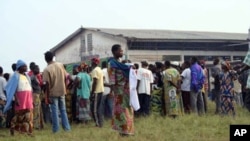The U.N. refugee agency reports more Congolese civilians are fleeing the troubled Equateur province in northwest Democratic Republic of Congo. The UNHCR says tens of thousands of Congolese have crossed into the neighboring Republic of Congo during the past month to escape the violence.
According to government estimates, 84,000 DRC refugees have fled into the Republic of Congo since early November. That is when inter-ethnic violence between Enyele and Munzaya tribes erupted over farming and fishing rights.
Some of the new arrivals told the UNHCR they fled after hearing that Enyele militiamen were advancing toward the town of Gemena.
U.N. refugee spokesman Andrej Mahecic explains Enyele tribesmen launched an attack in late October, killing and wounding scores of people. He says a number of people who fled feared the government's counter-offensive.
"In the last wave of arrivals, UNHCR staff met people with fresh gunshot wounds, as well as nine registered rape cases, three of whom were girls under 18 years of age," said Mahecic. "Together with our partners we are trying to cope with the new influx, but aid reserves are running low as the number of refugees mushrooms and current needs overcome the actual resources."
"In addition, humanitarian agencies are facing considerable logistical obstacles as the entire refugee population is scattered along a 500-kilometer stretch on the banks of the Oubangui river," he added.
Mahecic says the refugees are living in overcrowded conditions and the risk of respiratory infection, diarrhea as well as malaria are high.
He says the UNHCR and its partners have created nine health centers near areas where the refugees are concentrated. He says the agencies also are running several mobile clinics to reach people camped out in more remote areas.
"Due to lack of clean water, the refugees are using the river for their needs, which is another major health risk," said Mahecic. "We are distributing water-purifying tablets to make the water safer for consumption."
"The aid agencies have also installed six large water bladders with a combined capacity of 60,000 liters in the vicinity of Betou in northern Republic of Congo where nearly 55,000 of the new arrivals are now sheltering," he continued.
UNHCR spokesman Mahecic says the presence of so many Congolese refugees is putting a lot of pressure on local communities. He says some are living in public buildings such as schools.
He says an estimated 100,000 people may have been internally displaced since early November in Equater province. He says the UNHCR is planning an assessment mission to this area as soon as security conditions permit.




